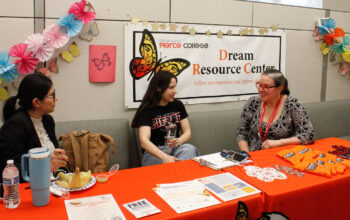Sena Schmidt
America is deemed by many as “the land of opportunity” and is a country in which so many of our ancestors and existing immigrants seek to inhabit in hopes of a better life.So then why is it that, according to a 2004 survey of the United States’ Census Bureau, twelve and a half percent of the U.S., or nearly 36 million people are “officially poor?” Other estimates put those numbers closer to 18 percent, or 48 million people.One would expect that, with an economy such as ours and with the U.S. being considered one of the richest countries in the world, this would be unheard of.Yet, it is an unfortunate fact and among the demographics of those living in poverty are Native Americans, who are underrepresented as one of the largest racial groups in America suffering this disparity.Leland Shapiro, director of Pierce College’s pre-veterinary science program, has taken on the role of being one of the many volunteers for the Walking Shield American Indian Society, a non-profit organization founded in 1986 by Phil Stevens, who is of Lakota heritage.According to Walking Shield’s Web site, “31.2 percent of the populations on reservations live in poverty.”This organization is responsible for supplying impoverished Native Americans on reservations in North and South Dakota with food, school supplies, health care, computers, housing development and toys for the children every year.”In order to be a good vet, you have to first be a good person,” Shapiro said.Shapiro, who once worked for Love Is Feeding Everybody (LIFE) and currently volunteers for L.A. Mission, helps the Walking Shield by providing backpacks filled with necessities such as warm clothing, toiletries, school supplies and a toy for each child on the reservations.”The first time I [visited the reservation] I cried,” he continued.Along with Shapiro, many other faculty and students aid in the charity of Walking Shield’s program, which include Pierce’s child development students.”Many of the Pierce College faculty and staff have been very generous,” said Shapiro.The Walking Shield headquarters are located in Orange County, where donations from all over are gathered until there are enough supplies to fill the numerous boxes, which are then loaded into a truck and driven to North and South Dakota reservations, hours away from any city.Walking Shield’s attention on the reservations in that part of the U.S. is mainly because of the harsh winter conditions and the fact that, since the people on those reservations are far from the cities, their source of income is much less since they do not have the casinos or money from tourists helping their financial situation.Gary Gordon, Executive Director of the Native American Indian Housing Council said on the Walking Shield Web site “The needs – everything from electricity, water and sewer systems to actual homes-are countless, yet there are few resources, especially on our reservations.”However, Shapiro does not believe that simply supplying the Native Americans with handouts will help their condition; he believes in the power of receiving a proper education.”I would love for every one of them to have the same opportunity I had to receive an education,” Shapiro said. “Enough so that they can get a decent job.”This is one reason Shapiro highly regards the L.A. Mission’s struggle to not only supply the financially dependant with food but they also offer job training to 150 homeless people a year.”The best charity,” Shapiro said”is to be able to make it so that whoever you give to will be able to give back to others.”Shapiro has a wife and two kids, daughter Ilana, a student at Pierce, and his son, Aaron.For more information on how you can help the Walking Shield organization go to www.walkingshield.org.



